“The Loss”
Written by Hilary J. Bader, Alan J. Adler, and Vanessa Greene
Directed by Chip Chalmers
Season 4, Episode 10
Production episode 40274-184
Original air date: December 31, 1990
Stardate: 44356.9
Captain’s Log: Troi is having a session with Ensign Janet Brooks, who lost her husband to an accident. It would have been her husband’s birthday, and she woke up that morning wanting to hold something that belonged to him—but she had gotten rid of everything of his after the funeral. Troi then walks over to a closet and pulls out a music box, which she had held behind for when Brooks would need it.
When the session ends, Troi starts getting wonky, eventually passing out at the exact same time that the Enterprise encounters weird sensor echoes. They come to a full stop and check it out, but there is no reoccurrence of it. So Picard orders them to go to warp, at which point the ship lurches—according to La Forge, the warp field collapsed. Meanwhile, Allenby reports that the ship is moving despite being at all stop, being pulled along at sublight speeds. All attempts to move fail, even though the engines are fine. There’s no indication of a tractor beam, sensor readings are indeterminate, and they have no idea what’s going on. To make matters worse, Troi’s empathic abilities have simply stopped. She can’t sense anything. Crusher finds some minor brain damage, and will try to figure out what’s going on.
Riker goes to see Troi, and she’s startled by the door chime ringing, since she didn’t sense anyone coming, and she immediately goes on the defensive when all Riker wants to do is help.
Troi sees Brooks again, who says she feels like a new woman after spending all night having a good cry. She finally has accepted the loss of her husband. Troi cautions that one night of crying can’t make up for months of denial, but Brooks insists that Troi is wrong and that she’s fine now, really.
Data and La Forge launch a probe, which takes a while to find anything—but then when Data searches for virtual particle trajectories, they find the Enterprise surrounded by a huge field of tiny objects. Scans reveal that they are beings that are only in two dimensions. They couldn’t see the beings clearly because they can only be observed straight on—on edge, they become invisible.
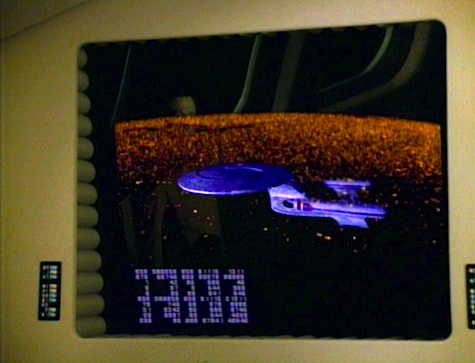
Speaking of being on edge, Troi snaps at La Forge when he comments that they can’t tell if the beings are sentient, and then walks out of the meeting before being dismissed. She runs to sickbay, where Crusher says that she hasn’t figured out a way to cure her, and Troi tears her a new one. She realizes that she can’t do her job, indeed, can barely function. She offers Picard her resignation as ship’s counselor. Picard resists—empathic abilities aren’t exactly a requirement for the position of counselor—but she insists, self-righteously snapping at him, too.
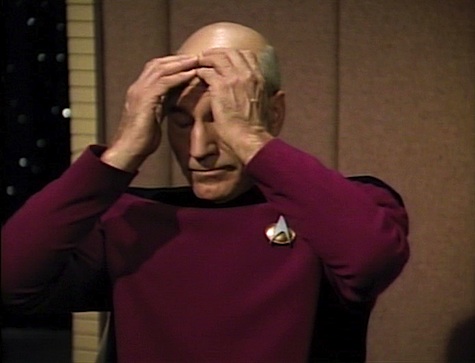
The Enterprise tries to break free of the 2D beings and fails, but Data detected an odd movement in response to their attempt, which Picard theorizes might be an attempt at communication. Unfortunately, they are being caught in the gravitational field of a cosmic string fragment, which makes their situation far more urgent.
They try firing photon torpedoes in the 2D beings’ path to try to get them to alter course, and when that fails, they fire into the field—which also fails.
As Troi is packing up her office, Brooks comes in and informs Troi that she was completely right about her, that her night of crying was just a band-aid on a bullet wound. Picard then calls her into his ready room—they only have five hours before they collide with the cosmic string fragment, and he has to insist that Troi help Data try to communicate with the 2D beings. Even crippled as she is, she’s the most qualified person on the ship to figure out how to communicate with the beings. (A thousand people on a ship whose mission is to seek out new life, and they don’t have any linguists? Really?)
Troi suggests trying to figure out what their instincts are, what stimulus they would respond to. She hypothesizes that they’re heading to the string for the same reason that a moth goes for a flame or a horse runs into a burning building. Data suggests they use the Enterprise to impersonate the cosmic string fragment by matching the vibration of the string.
That works, the Enterprise pulls free, and Troi gets her groove back. With the return of her empathy comes answers: the beings live in the cosmic string, and they were just going home.
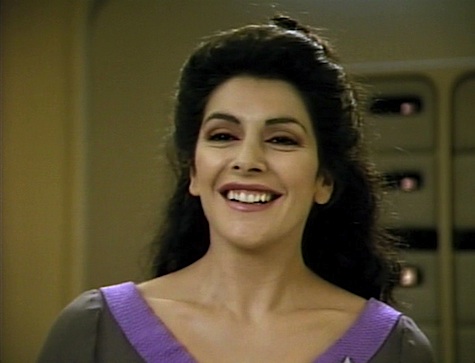
Can’t We Just Reverse the Polarity?: While cosmic strings are hypothetical, the use of them here matches with current scientific theory about them, a refreshing use of real science—though the stuff about 2D beings, graviton fields, warp fields, subspace vibrations, and other nonsense are as made-up as ever.
Thank You, Counselor Obvious: Troi makes the world’s worst patient, basically being mean to everyone. Without her empathy, she sees only surfaces with no depth—it’s as if she’s stuck on the holodeck with all fictional characters.
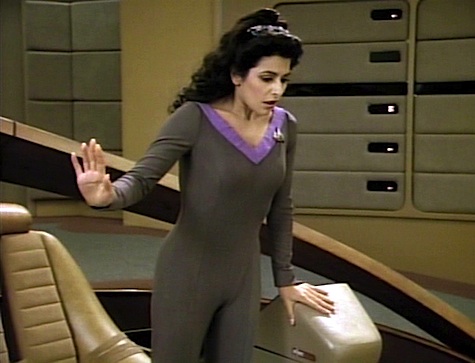
If I Only Had a Brain…: Data provides an ETA down to the minute, prompting Riker to playfully ask, “What, no seconds?” Data explains that he has observed impatience among those to whom he speaks when he provides intervals down to the second, a behavioral adjustment never managed by, say, Spock….
Syntheholics Anonymous: Guinan tells Troi that she’s going to apply for the position of ship’s counselor by way of getting Troi to realize that she is perfectly capable of being counselor without empathy.
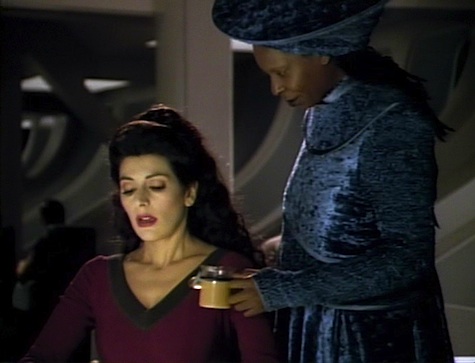
No Sex, Please, We’re Starfleet: Riker tries to help Troi, and only partly succeeds. When he hugs her, she asks if this is how he solves all his personnel problems. Riker smiles, and says, “You’d be surprised how far a hug goes with Geordi—or Worf!”
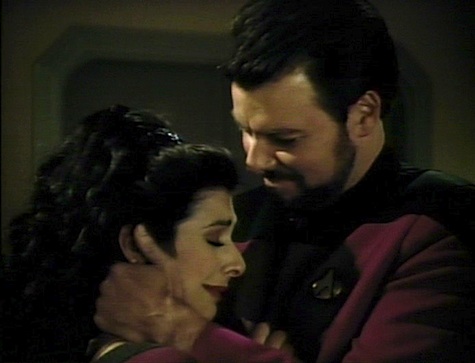
In the Driver’s Seat: Ensign Allenby returns after last week. Given that her position as pilot of a starship requires her to be aware of cosmic phenomena that she might have to navigate around, it makes no sense, none, that she wouldn’t know what a cosmic string was. That’s a spectacular failure of writing, right there. The person at conn is the last person who would stupidly ask, “Cosmic string?”
I Believe I Said That: “Therapists are always the worst patients—except for doctors, of course.”
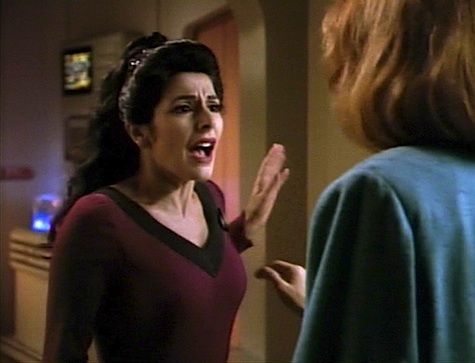
Crusher speaking truth to Troi once she’s better.
Welcome Aboard: Kim Braden is adequate as Patient Who Is Needed To Move Troi’s Character Arc Along, and Mary Kohnert does okay with her lines as the conn officer of the week.
Trivial Matters: This is the first writing credit for Hilary J. Bader, who would go on to an impressive writing career, contributing to TNG as well as Deep Space Nine and Voyager. She would also write the videogames Star Trek: Klingon and Star Trek: Borg, composing the Klingon Anthem for the former (which would later be used on screen in the DS9 episode “Soldiers of the Empire”). She went on to write for a variety of genre shows in both live action and animation—Xena: Warrior Princess, Young Hercules, Batman: The Animated Series, Superman: The Animated Series, Batman Beyond, and The Zeta Project—until her death in 2002 of breast cancer.
Bader named the T’illi Beta system after her grandmother Tillie Bader.
This episode is the first mention of the Breen, identified by Data as a species that can’t be sensed empathically (along with the Ferengi, who were formally established as such in “Ménage à Troi“). They will be mentioned several other times on TNG (most notably in “Hero Worship”), and first appear on DS9‘s “Indiscretion.” They become a recurring antagonist during the Dominion War arc on DS9.
Allenby also appears in your humble rewatcher’s Starfleet Corps of Engineers eBook novella Many Splendors (reprinted in What’s Past), where it’s established that she resented Wesley Crusher for blocking her ability to advance on the Enterprise.
Make it So: “We have to get two-dimensional.” After a run of episodes that all have family as their central theme (to varying degrees), we get a straight-up science fiction story that theoretically allows for some character development.
Michael Piller said in an interview that they considered making Troi’s loss of empathy permanent, and if that had been done, this episode would’ve meant something. Without it, it just turns into another tiresome problem-of-the-week episode.
Ideally, it would mean a chance to play with Troi’s character a bit, but mostly all it does is give Marina Sirtis an opportunity to be bitchy. And even that gets oversold. Every single scene Troi is in turns into a game of “who will she snap at this time?” The only scenes of that type that work are her ripping into Crusher for not being there right away when she called and her pointed deflections of Picard’s patronizing attempts to be helpful. (Marina Sirtis got a lot of kudos from people with disabilities after this episode aired.) But it gets very tiresome very quickly, and there’s nothing else in the episode to pick up the slack, as the 2D beings aren’t all that interesting once you get past that they’re 2D.
(After this episode aired, folks who were not especially fond of TNG commented that this crew should have no trouble relating to beings who were two-dimensional…)
It is good to see Troi actually being a counselor with Ensign Brooks. That subplot is bog-standard, but it works for all that because it feels real. Brooks’s stages of grief are textbook, but they’re in the book for a reason. (Honestly, with a thousand people on board, it’s far more likely that Troi’s entire day would be spent sitting in that office talking to folks than it would sitting uselessly next to Picard on the bridge.)
And then at the end, the switch is thrown, Troi has her superpowers back, and everything back to normal, leaving us with an episode that feels depressingly inconsequential.
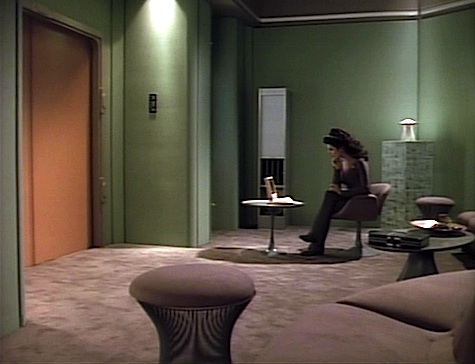
Warp factor rating: 5
Keith R.A. DeCandido wrote Troi being bitchy in his novel A Time for War, a Time for Peace, while she was planning her and Riker’s wedding, one of his many many many many works of Star Trek fiction. Go to his web site for all kinds of KRADish goodness.










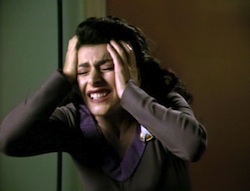
Similar feelings about this episode. The only Troi episode I really love is Thine Own Self and it was just the secondary plot right where she belongs. The writers never seemed to have much for her to do and when they did it was uneven. I’d probaby rate this a 4, but the exchange between Riker and Data could push it to a 5 for me.
Troi is advertised as “ship’s counselor” but also advises on first contact situations, diplomatic missions and hostile confrontations. The concept is a good one; the execution was mostly terrible. I’m not sure I ever liked a Troi episode. It’s hard to be sure of my 25 year old recollections, but I’m pretty sure I preferred Wesley over Troi, even with the terrible writing of his role. It’s still a tough call.
The best that can be said for this episode is that it’s better than The Child.
The sci-fi part of the story really doesn’t make a lot of sense — are we to believe that all the Enterprise’s sensors are all on the same plane, which just happens to be the plane that the 2D creatures are aligned with?
It was always sad to me that they never did more with Troi’s character. Honestly, by the time they got into the movies, they could have at least let her die heroicly saving the ship or something. Anything to stop the bland writing they constantly gave to her.
The best writing in the world wouldn’t hide the fact that she’s not all that great an actress.
On another note, I’m looking at that last picture and wondering why they would waste all that space in a starship for the those high ceilings.
RDBetz: That’s a necessary conceit of television. Every interior space on TV has high ceilings because it’s easier to construct lights and set up cameras in a high-ceilinged space than a tight one.
—Keith R.A. DeCandido
With a thousand people on board, you wouldn’t want your diplomatic/first contact advisor to be the same person as the sole member of staff psychiactric department – not necessarily because the same person couldn’t do the jobs, but if you’ve decided counselling is important enough to provide on your starship you should make sure that it isn’t going to be randomly interrupted by the exingency of the week.
I remember loathing this episode. Lazy writing whereby a character deals with a crisis by behaving like a spoilt character (this happens to Riker as well when Captain Picard is temporarily replaced) which never rings true to me. These people are meant to be highly trained professionals. I call it lazy writing as it provides a simplistic way to create tension within the story and can leech sympathy away from a character.
Meh. Not good, but not particularly bad either – Star Trek by numbers.
I would have given the episode +2 if they would have shown Worf getting a hug from Riker. That would be epic.
I can’t really recall what I thought of this episode. I liked the Troi focus, but I do agree she was somewhat too petulant. Although, really, it’s hard to say how anyone would deal with facing a disability. That kind of fear and anger is probably normal, but perhaps it could’ve been handled more deftly.
The idea of encountering 2-dimensional beings was interesting, but it’s problematical that they could exist in a 3D universe without their innards spilling out. After all, their bodies would only have “skin” around the outer edge, because that’s all they’d need in 2 dimensions. Once in our universe, they’d suddenly have a top and bottom they’d never had before, and nothing to contain their material in either direction. Although I suppose it’s possible their bodies could’ve been entirely solid somehow, like some kind of 2D crystal.
Keith’s right — the late Hilary Bader went on to make impressive contributions to the DC Animated Universe in the ’90s. I really enjoyed the way she wrote Lois Lane on Superman: The Animated Series.
@7: It’s a good point about the problem of having Troi be both the captain’s contact/diplomatic advisor and the whole crew’s sole mental health professional. It was a good idea to establish that there was someone aboard to handle the crew’s mental health as well as their physical health, but they should’ve taken the next step and realized there should be a whole department, not just one person. Deanna should’ve concentrated on counseling the command crew and had a staff under her that took care of the rest of the crew.
But then, that’s the problem with series TV — you need to focus on a small core group, so they have to do everything. Realistically Spock or Data or Dax or T’Pol should’ve been supervising a whole legion of scientists rather than doing all the sciencifying themselves. But it would cost too much to have that many characters, so you simplify by having one person do it all. Sometimes I’ve thought it would make more sense to do a show about a small crew of only a dozen people or less, so that it would be more plausible that the same finite number of people did all the work.
Christopher: First of all, “sciencifying” is my new favorite word.
Secondly, you’ve put your finger on the button of why, when John Ordover and I developed the Starfleet Corps of Engineers series, I was insistent that the ship be a small one with only about 40 people. I got really tired of large ships with the same seven people doing all the work while hundreds of other people stood around with their thumbs in their ears.
—Keith R.A. DeCandido
Is “sciencifying” anything like “technobabulation”?
a behavioral adjustment never managed by, say, Spock….
I imagine Spock thought human impatience was funny. Very dry sense of humor, Spock.
A little off topic, but we seem to be in this vein… how many people do you really need to run a starship? The Enterprise usually has about 1100 people on board at any given time. If we assume a quarter of them are family members (which is probably a little large) we get 825 crew. Split them into three shifts and you’d 275 per shift (actually you’d probably have a larger Alpha shift and smaller Beta and Gamma shifts). But what do they all do? Keith points out that the Corps of Engineers ships out onboard Saber Class with 40-50 people, a Defiant Class has about 50 people on board, Norway class gets you about 200 crew, , Intrepid Class like the Voyager are 200 crew, Excelsior class 430, Akira Class 500, Nebula Class 750. What do they all do? Why does the Galaxy Class need so many people on board- it’s not a cruise ship- you don’t have housekeepers or cooks or entertainment directors (though some poor ensign is probably the Morale Welfare and Recreation officer in charge of scheduling the holodeck beach volleyball tournament)… do we ever get any explanation for why the ship has this many people on board?
It’s an indication how meh this episode is or how much I like Sir Patrick Stewart that the most simple line spoken by him is one of my favorites in the episode. When Troi whines she’s doing the best she can Picard responds “No one has suggested otherwise”. Don’t know why I like that line so much but I do.
The bits about a hug for Worf and the no seconds comment are up there too.
I’m not sure I like the idea they needed to launch a probe to see the creatures because the the Enterprise isn’t 2-d itself. Doesn’t the Enterprise have sensors higher and lower than exactly where it intersects with the 2-d creatures?
“The best writing in the world wouldn’t hide the fact that she’s not all that great an actress.”
She did much better when she switched to voice work for animation. No, really. Her performance as Demona in Gargoyles actually helped sell the role of a complex, conflicted antagonist.
Woo, we have officially caught up :)
I liked this episode okay…I might have given it a 6 or 7. I think it is an interesting concept although I agree that the fact that she gets her abilities back by the end cheapens it a bit. And, yes, Troi was being really whiny and didn’t show a whole lot of grace, but I can’t say it’s unrealistic either.
Actually, I thought Riker came off as a real jerk.
I didn’t particularly dislike this episode, but it is one case where I’ll jump on board with, “you know she’ll get her powers back at the end.” I partly knew that because, well, I knew since it’s an old series. But it just sort of fits with the episodic nature of the show they chose for back then. A modern drama might have made her lose her powers for half a season or more.
@11 CB– I don’t know we can really say what would happen to the creatures; you may be thinking a little too 3-dimensionally. I don’t know that being in a 3-dimensional reality would suddenly add depth to them with uncontained inards. Indeed, that’s my point–we don’t know. We may have a tendency to envision a really small edge, but in reality there’s no edge–none. I don’t think that we as 3-dimensional creatures can fully comprehend that. There’s also no way to know for sure would would happen if truly 2-dimensional creatures moved into a 3-dimensional universe.
@15 Mike–I think a lot of the crew might actually just sit around. Sure, some departments like engineering probably have people running all over the huge ship fixing little things or scrubbing conduits, but on a vessel of exploration, a lot of the people are scientists. In “Pen Pals” we saw a bunch of random geologists studying rocks. Marla Aster in “The Bonding” was an archeologist or anthropologist or something. And even in TOS “Space Seed”, Kirk makes a comment that they final have a chance for the historian to do something for a change. Maybe some of these scientists have enough data from the various missions to keep them busy until the next one (even if it’s just boring cataloging stuff), or maybe some of them are working on their own research through simulation or using the ship’s data in new ways. But maybe some of them are just sitting around waiting for the next mission.
But right, I don’t think the actual crew necessary to “run” the ship is that large, but there are just a lot of scientists. Heck, there’s supposedly a “Cetacean Ops” acquarium, so all those marine biologists are probably doing something all day. I think there may just be a lot of research going on on the Enterprise at any given time.
Oh, I forgot to mention–that second picture with Picard looks like it’s forshadowing one of Patrick Stewart’s future roles–
“Hear me, X-Men!”
@19 & 15 Interesting about crew requirements. When i was in the Navy, a Frigate could be sailed by 3 people, but it carried 180. A lot of the overhead was to be able to man useful but not critical positions in multiple shifts, and also to have enough manpower to do maintenance, fight fires, and most importantly, to be able to man every system during general quarters/battlestations. One of our favorite saysing is that “on a ship, something always needs done”.
A point on the ships driver, is a starship piloted more like an aircraft, or like a ship? Our helmsman was alsys the one of the lowest ranking members of the crew, usually someone who’d only been abaord for a few weeks out of boot camp. The Officer of the Deck would tell them what course (compass direction) and speed to go. From their seat the helmsman couldn’t even see out of the window. So I’m curious what a star trek helmsman’s responsibilites are supposed to be?
@19: I never said they would gain depth. My point is that if the 2D beings were in our 3D universe, which they were, then they could have forces act on them from above and below, so any interior contents not physically connected to their skins in 2 dimensions could be pushed clear out of their bodies by forces acting on them in the third dimension. By the same token (and this is where I got the idea from), if 3D beings like us were transported into a 4D universe, our insides wouldn’t be enclosed in all four dimensions, only three. So we’d be completely “open” to forces pushing on our innards from the fourth direction, with no skin in that direction to hold them in. So we’d simply fall apart.
About the crew, I agree. The idea is that most of the crew isn’t just for the drudgework of running the ship, but consists of scientists and researchers. The job of the ship is to take the scientists to the places where they can gather data and samples and stuff and do science to it.
The developers of TNG intended the E-D to be what I like to call a university village in space — a mobile research institute with a full scientific staff and lab facilities, plus the infrastructure and personnel needed to support them, plus the residences and community facilities for those people and their families. The problem is that the later producers of the show lost track of this and forgot about all the civilian scientists who were supposed to be on board, with Keiko being just about the only one we saw after a while.
I think we are misunderstanding one another. My opinion is that they wouldn’t have any “insides.” They can’t spill out when they are just a plane. Are you saying the plane gets stretched or squished because of the forces? My other point was that I don’t think we can be sure what would happen, since we really have no frame of reference. If the universe is really expanding in 4 physical dimensions as some theorize, then we technically exist in a 4-d (or higher) universe and are just incapable of perceiving it. In which case we’re doing fine. Maybe the 2-d beings exist in our universe as well, but they just don’t perceive it the same way.
@RPD: I think in Star Trek, the helmsperson has the same responsibilities. The captain is usually telling them what course to set, or course corrections. In some cases, they should know how to navigate around certain objects, but I don’t think they need to have the knowledge of physics to know what a quantum string is. Ops, the science stations, and the tactical officer all have access to sensors which would tell them of possible obstructions; they can inform the captain and the captain can order a course correction.
Another mostly harmless episode. Oddly enough, this is one of the extremely few episodes that I honestly don’t think I have seen since it originally aired. In fact the riker-data exchange has always been one of my favourit bits, and I had no idea it was in this episode.
Since I have not seen it in so long, my only comment will be from memory that Troi seemed bitchy, but even as a kid i thought, well who wouldn’t considering? If I went blind, I can assure you I would be a jerk to everyone around me.
But I also remember Frakes doing quite well in this episode. thats about it.
What I found most annoying about this episode is that Troi is supposed to be a trained councillor/psychologist. She should therefore be well aware that there are all kinds of reasons why a person might become temporarily deprived of one of their senses without this necessarily being a permanent thing. For her not to explore all those possibilities before simply flying off the handle and resigning her post is just not believable.
Surprise: I liked this episode, as it makes its point perfectly: just one change to a character, and the rest behaves just a bit differently. But what I like most is that it defines the Troi character: when she’s deprived of her spying superpowers, she is just an spoiled brat: the self control dissapears, and ta-daa, she starts to have human fears. Of course the rest of the episode has little success, and the romantic subplot is as clunky as ever, but I liked it.
Late to the thread, but I have just watched the episode today.
One thing that bothers me greatly and I consider a major writing failure is that everybody treats Troi losing her sense in a same manner we would treat a human losing her sight, but we know from “Tin Man” that Betazoids gain their powers when growing up (at their teenage years, I presume), so Troi should know how to live without her power. She may not be fine with it, but she should not see people as devoid of depth.
I have a lot of issues with this episode (which I listed in my IMDB review), but these are the big ones: This episode makes Troi impossible to empathize with as a character. Her “disability” is that she is essentially a normal human. The poor thing. And second, how great of a counselor can she be if she has to cheat (read minds) to be able to help people? It’s like Lance Armstrong complaining that he can’t use drugs to compete. Welcome to what the rest of us call everyday life.
I give it a 3.
This one’s a six or a seven–a pretty good episode. You can’t downgrade it because you know she’ll get her powers back, because this is episodic television, and if you’re going to give a 10 to any series of episodes in which Picard comes back to captain the Starfleet Flagship after leading the attack against the Federation at Wolf 359, then you HAVE to give the series a pass on this one. And you can’t downgrade it because Troy’s a bitch in it–that just makes her real. Any woman with that mother has a bitch in there somewhere.
A fair review. I can understand Troi’s “loss”, but the over-played bitchiness grows tiresome quickly. I did like the way she snapped at LaForge during the briefing. Finally, the redhead chick who Troi counsels seriously needs acting lessons.
This episode tends to highlight why I don’t like Troi at all as a character.
First off, she doesn’t actually contribute at all to solving the Problem of the Week, which is typical of her through the majority of the series. She ends up just overapplying her second recurring problem (Below.) then instead of being happy that the ship isn’t screwed she delights she has her empathy back. HEr role has always been to point out what has been painfully, PAINFULLY obvious to the viewer about the obvious villain or the character who clearly has a secret. I mean these things are clear BEFORE Troi opens her mouth.
But second off, in this episode she also tends to show that whenever she falls into the limelight, she winds up being a self-centered bitch. This episode ESPECIALLY made her egregious with her bitchiness.
My final problem with this episode is this: I’m all for understanding and support for the disabled and the recently disabled, however ALL my understanding and support for them goes away when they start acting like assholes about it. You’re disabled, I feel bad. If you don’t want that to be the focus of your life, fine. But when you start calling attention to it or acting like a jerk about it I’m not so understanding. No amount of disability justifies being a rotten person, I don’t care how unfortunate the person it.
That’s the problem with this episode and the writers’ position on Troi’s behavior on this one. Not only did they basically want to say people who lose an ability tend to be angry at everyone about it, but that they should get a free social pass on being a jackass about it. I fully disagree. If you’re sad and want to talk about it, fine. But the second you take out your disability on me (As Troi clearly does in this episode.) I’m no longer going to feel bad about your disability. In fact, I think I should be socially justified to call you out on being a jerk just because you’re disabled.
I liked Troi better when she switched to wearing a standard uniform and finally getting her commander pips because then she was a bridge officer who could command the watch and act like a competent Starfleet officer. Everyone of these people seen in the show are the heads of departments, except for Picard. Riker as Executive Officer is the head of the Executive Department, that provides support to the captain. Troi should have either been a diplomatic officer/counselor or not on the bridge at all until she passed the Bridge Officers’ Exam. There was no reason for her to be there for the reasons mentioned above. I also find this episode ANNOYING because she spends all her time complaining and then resigns her barely-mentioned commission (she’s a commissioned officer in a paramilitary organization wearing cheerleader outfits with her cleavage showing and we’re supposed to take her seriously?) because she can’t do her job. Not like EVERY other psychiatrist/psychologist on Earth who have to counsel people without extrasensory empathy. Shouldn’t an EMPATH be able to deploy natural empathy? Which leads me to another point. Does she actually USE any psychological training or just bluff her way through using the emotional states she picked up? If she was a competent therapist with a professional education in psychology, she shouldn’t have been such a completely emotional wreck. She should have been relieved and sent to a starbase to recover under professional care.
I think we’re spoiled by the ability to go back and watch any episode whenever. This is episodic television. You need to keep to the status quo or else explain the change every episode. Because you can’t count on your audience having watched the previous episode.
It’s this reason that DS9 was harder to watch for me. I have gaps in my TNG watching, but I know most of them. But missing the right DS9 episode could totally screw you over. Odo’s loss of shapeshifting ability only didn’t mess with me because it was ignored too often anyways. (It could solve so many dadblasted problems.)
You can’t have a “cosmic string fragment”. Cosmic strings can’t have ends, so they’re either shaped into loops or are infinitely long.
It’s an infinite fragment. :)
Yeah. I always took that oxymoron as a deliberate physics in-joke from the writers. I’d rather believe they wrote that with a wink, than assume they didn’t have a clue.
I thought it was pretty funny, anyway. A morsel of amusement in this less than thrilling episode.
Am I the only one wondering why this was a stressful issue? (The ship,not Troy). The beings were two dimensional and seemed to have hit the ship at the “neck”. Couldn’t they have just detached the saucer section to escape if need be? But I believe I enjoyed this episode more than most. You guys raised good points, but it was typical TNG and I like that! They’re not all going to be “Inner Light”.
Poor Troi. Something terrible happens to her, and her female best friend tells her to get used to it, whereas her male best friend accuses her of having been “too aristocratic” in the past. What’s the matter with these people?
Maybe it’s a cultural thing, but after years of reading Doctor Who books that include “aristocratic” as part of the default description of Nyssa (who we all love), I never quite got why Troi got all prissy about being called that. It’s like feeling insulted at being called a “gentleman”.
@39/cap-mjb: It isn’t the word itself, it’s the tone and the context. “I’d always thought there was something a little too aristocratic about your Betazoid heritage. As if your human side wasn’t quite good enough for you.” – That’s clearly an accusation.
I’ve always enjoyed this episode, even though it’s not stellar or anything but it’s definitely not boring. There are a lot of accusations being thrown at Troi for being bitchy and unprofessional but just put yourself in her shoes and imagine going blind or deaf or losing the ability to walk and your probably find her rage and emotional outbursts quite justifiable. This was all new to her and we can imagine these events took place in a relatively short span of time so she really hadn’t had the chance to adapt to her loss of empathy yet or return to being “sympathetic” in the minds of some of you. I in fact did feel sorry for her because I found everything about her reactions to be realistic. Anyway, I love the first scene between Troi and Guinan in Ten Forward. Guinan was as snappy as ever. I enjoyed when Troi told Data told that “We need to get two dimensional” and he replied “Pardon me?” And I chuckled when Worf asked Picard to fire torpedoes directly at the aliens and Geordi piped in that they just fire the torpedoes ahead of the aliens not at them, because Worf shoots this look to Geordi like, “thanks a lot dude”. Riker also proved damn lovable because he was constantly there for Troi and always reassuring her. I also liked the sci-fi mystery of the week element and how the crew was going to resolve it this time. Finally, I disagree that this was a true reset of the the Troi character that meant nothing because she ultimately gets her powers back. Yes, that is a reset, but as pointed out by Riker during the course of the story, and Troi herself at the conclusion, she finally starts to acknowledge her over-reliance on her Betazoid powers at the expense of her human intuition and instincts. Sure it’s not as dramatic as leaving her disabled at the end of the episode but it’s still growth of the character nonetheless.
In fairness to Troi she has been abruptly deprived of her main professional tool and a sense she’s had all her life it’s understandable she should feel panicked and handicapped.con the other hand one would hope a mental health professional would deal with it better.
Troi is an interesting character and being an empath it sure does make sense to have her on the bridge, seeing through every bluff any hostile captain might try to pull.
But I feel that she’s hardly ever being used right. Be it that her advice is just ignored (like on that dreadful ‘Samaritan Snare’ episode) or she’s given extremly stupid lines (‘I sense the tension on the ship is rising’)
And here again there’s just so much more that this episode about Troi could have done. Seeing her complain again and again get’s old very quickly.
Yes, of course it must be quite a shock if you lose one of your senses all of a sudden. And yes, ‘normal’ people cannot know what it’s like. It’s a bit like trying to explain colours to a blind person (if that comparison ever made sense, it’s now)
But I don’t want to hear about it all the time. And certainly don’t want to hear sentences like ‘how can you live like that?’
The second plot is what makes this episode so… Indifferent. Just one of those plots, but with better writing would have been better, imo. Now it just feels incomplete on both ends.
Wait a minute, Troi is the one and only psychological counselor for over a thousand people living and working in a high stress environment?????
Yeah, that’s stupid.
I agree with Our Humble Re-watcher that this episode is relatively inconsequential. However, I think I has just slightly more value than nil. The fact that the episode resonated with people with disabilities is pretty cool. I’d also argue that suddenly being blind or deaf for a day without any idea if it was permanent or not would be even more traumatic than if it were 100% permanent. Perhaps the TNG staff could have gone halfway with Troi developing a phobia of losing her empathic abilities. But I digress, sadly character development didn’t become a huge thing until DS9.
On a side note, I kind of felt like Kim Braden’s performance was a bit wooden. I liked her better in Star Trek Generations, albeit in a much smaller role, as Captain Picard’s wife in the nexus.
@11 CB there are 5000-6000 people aboard an air craft carrier, so I don’t see how 1000+ on a starship is that out of the ordinary.
This episode is a prime example of how Trek had failed to portray its Human characters – let alone other characters – as capable of empathy and compassion toward those who are different from them. Deanna’s loss of her ability would be akin to losing one’s sight or hearing. And she was expected to immediately get over it and trust her “Human” instincts. Worse, it’s another prime example of Trek celebrating Humanity. I have become really sick of it.
I think a lot of folks are being pretty hard on Troi this time. HAVING a disability isn’t the same thing as suddenly LOSING an ability you have. Her reaction is perfectly understandable; I would challenge anyone here to suddenly lose a body part, an intellectual skill, or any other kind of ability and maintain an even emotional keel right away. In terms Troi would use as a psychotherapist (and which she was actually referring to in her counseling of Janet Brooks), she needs to go through the grieving process (part of which is anger), before she can “get over it,” as some people seem to think she should have immediately done. In fact, I see the two women’s losses as somewhat analogous, and I think that maybe we’re meant to see this, and empathize with Troi just as she did with Janet. Also, Crusher, with her comment that doctors are the most difficult patients, makes a good point (as does Riker in his rather snarky way) — people in the “helping professions” have a hell of a time when they find themselves “needing help,” and part of it, no doubt, is that there’s a certain sense of control (if not actual power) that goes along with spending most of one’s time taking care of people who are (ostensibly) needier or more vulnerable than oneself. Now, all of a sudden, YOU’RE the “needy” one, and it’s not surprising that this can wound a person’s sense of self — and yeah, maybe her pride, as well — pretty seriously.
I’ve been slowly re-watching the series, and this is the first episode I’ve come upon that I have absolutely no memory of. I’m sure I have watched the entire series before, so it must have just made zero impression on me, and I can see why.
Very belated response to @23/crzydroid: “My opinion is that they wouldn’t have any “insides.” They can’t spill out when they are just a plane. Are you saying the plane gets stretched or squished because of the forces?”
I’m saying that when 2D beings enter a 3D universe, they aren’t constrained to a plane anymore. Living in a plane universe, whatever contains their innards only needs to work in 2 dimensions, so when they’re removed from that plane and enter a 3D space, their innards are just hanging there without anything to prevent them from moving perpendicularly to the plane of their bodies. Unless, as I said all those years ago, they’re solid all the way through.
“If the universe is really expanding in 4 physical dimensions as some theorize, then we technically exist in a 4-d (or higher) universe and are just incapable of perceiving it. In which case we’re doing fine.”
No,we’re constrained to our 3D space which is in turn in a larger higher-dimensional space. If we were to leave the confines of our 3D space into that higher-D space, then our innards wouldn’t be contained in higher dimensions, because our skin only exists in 3 dimensions.
@37/darthdoggydog: “The beings were two dimensional and seemed to have hit the ship at the “neck”. Couldn’t they have just detached the saucer section to escape if need be?”
As I recall, they were bisecting the saucer at its widest point, which is why they couldn’t be seen, because the main sensors are in that groove along the saucer rim.
19: They pulled off something similar in DS9 after Odo lost his ability to shapeshift for nearly half of S5 but I always knew he would get them back somehow. And although morose at first, at least Odo didn’t jump on every single person like Deanna does for much of The Loss. 20: Picard’s moved on from face palming – it must be bad! 31: My Dad was like that when he lost the use of his legs. He found it difficult to look beyond his own pain and started to take it out on his nearest and dearest, but unlike Troi, he didn’t magically regain the use of his legs. He spiralled further into despair until the day he died. 32: I’m not sure leaving in the middle of your shift to take a bath is “competent” behaviour for a Bridge officer. 37: The saucer module might have become caught in the wake of the subspace beings as well. 42: The last time Troi was like this was when she was an adolescent, before her Betazoid empathy kicked in, so that may explain a lot about her behaviour in The Loss. 43: Does she only sit on the Bridge when it’s a slow day at the office? 46: I’d totally failed to notice she was Mrs Picard, but yeah you’re right!
I understand that the clock ticking to some horrible outcome is a tried-and-true means of creating drama, but it seems like the writers, especially in season 4, use it way too often. Seems almost every week either someone on the show or the Enterprise in general is hurtling toward impending doom as time grows short…. it’s exhausting.
Given that this episode is basically about disability, I think that it was something of a missed opportunity to not involve Geordi (i.e., the only regular character who’s actually disabled) in this plot somehow.
@54/Iacomina: TNG previously did an episode revolving around disability in second season’s “Loud as a Whisper” with the deaf alien negotiator. That character had a brief moment of bonding with Geordi so perhaps the writers felt it would have been redundant to do something similar between him and Troi in this episode. Plus, there’s the fact that Geordi was born blind so it’s not like he ever had to experience “the loss” like Troi has.
@55/garreth Yeah, so he’s never experienced the loss of an ability, but surely he has experienced the kind of awkwardness from other people that Troi talks about. And as for Geordi having already bonded with Riva over disability, disability is part of his character just as much as engineering is; if it’s ever going to come up, surely it should be when people are throwing “blindness” around as a metaphor/
@56/Iacomina: But really though, wouldn’t humanity have evolved enough by the 24th century that we’re not awkward around others with a disability? I think it’s just taken for granted that Geordi can see just fine, better in fact, than the rest of the crew and no one sees him any differently. The crew is acting awkwardly around Troi because they don’t know what it was ever like to be empathic so it’s much harder for them to relate to what she’s experiencing. And I think Geordi and her would still therefore have that disconnect, where as not the case if say Geordi were born seeing and then eventually lost his sight.
I love this episode. Probably because it’s Troi-centric and because I really like “temporary disability” stories. They deliver so much intense emotion. I think Marina Sirtis did a FANTASTIC job in this one. It was great seeing the controlled Troi lost control. Plus, I found her anger and helplessness here to be very realistic.
Yes, it would’ve been interesting if the loss was permanent. However, I’ve grown up with these “disability of the week” stories and I’m just used to it. For me, it’s TV as usual, and it seems normal.
Riker can take his would-be tough love of laying into Troi about her “aristocratic” Betazoid nature and flush himself straight into space. Ugh. I can’t believe he even has the nerve to move in for a kiss when she’s all better, except wait a minute of course he does because he’s Riker.
The Enterprise can’t move, but their Probes and Photon Torpedoes can?: It was established that once the Enterprise was caught in the Graviton Field of the 2D beings that the ship could not move, no matter what form of movement they tried to use, the only thing that broke them free was mimicing the frequency of the Cosmic String Fragment and essentially confusing the 2D beings.
But when they launched a Probe not once but twice the Probes they launched had zero issue moving in that same Graviton Field, there is no reason to suggest that they should be able to, same with the Photon Torpedoes, why was it never explained why these smaller objects, with far weaker means of propulsion could move in that same very powerful Graviton Field?
The ship was caught in a flat plane that bisected the saucer. It couldn’t move because the plane was in direct contact with the ship, so they were held by it in the same way a boat in a frozen-over lake would be held in place by the thin layer of ice on the surface. But the probes and torpedoes were fired from other parts of the ship, below the plane of the 2D beings, so they weren’t trapped within it.